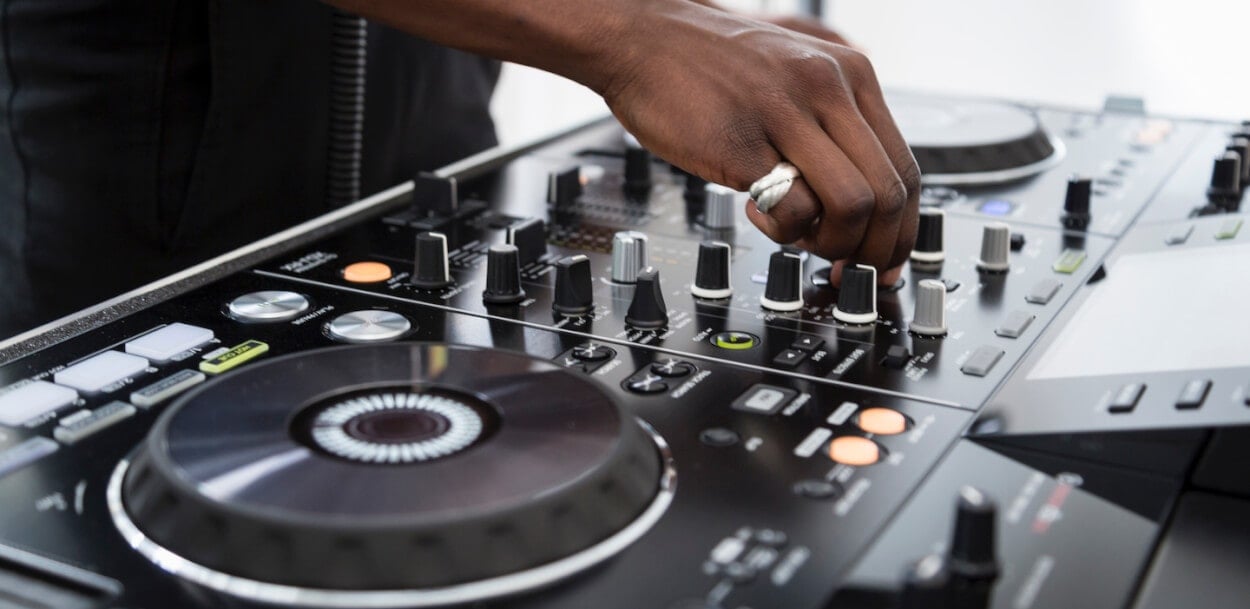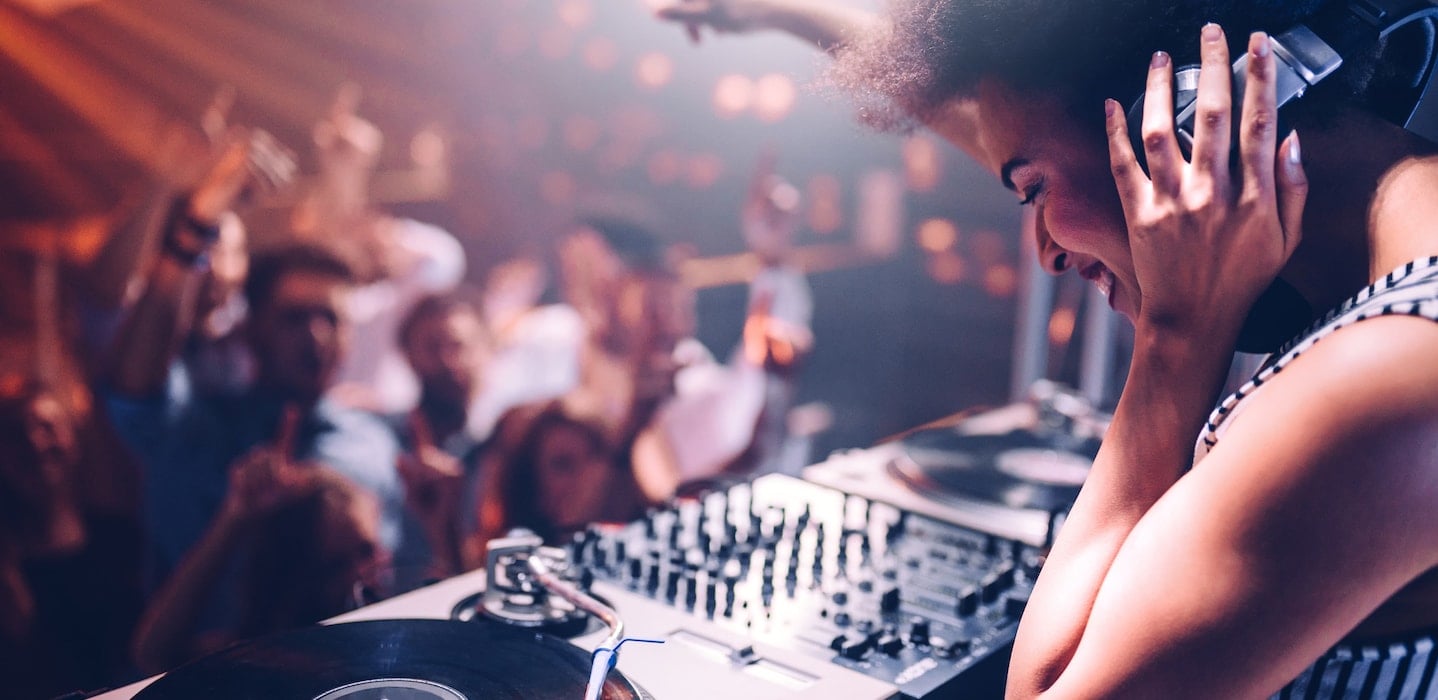Advancements in production technology and new methods of consuming music have made the world of DJing extremely diverse, and its definition evermore vague. When physical discs are becoming increasingly rare, it’s no surprise the term “disc jockey” doesn’t quite ring a bell.
However, the added variety in the field also opens the door to far more opportunities and more pay.
To uncover how much you can earn as a DJ and—more importantly—how you can maximize these earnings, take this article for a spin!
How much do DJs make?
To paint an accurate picture of how much DJs make, you first have to understand what a DJ is (and what type of DJ you want to be). According to music writers Bill Brewster and Frank Broughton,
“What a DJ does is this: he knows music. The DJ knows music better than you, better than your friends, better than everyone on the dancefloor or in the record shop. Some DJs know their chosen genre better than anyone else on the planet.”1
This definition tells us that DJs can’t be pigeonholed into a singular genre or form of music consumption. This fact makes quantifying your potential income a bit tricky.
As a starting point, let’s look at the Bureau of Labor Statistics’ figures for “Broadcast Announcers and Radio Disc Jockeys”:2
- Median hourly wage: $16.65
- Average DJ hourly wage: $25.76
- The top 10% earns about $51 per hour
- The bottom 10% earns just under $10 per hour
The disparity between the top and bottom ten percent of DJ earnings is already significant. However, these numbers don’t even take into consideration the more recent (and extremely popular) manifestation of the DJ: as a performer and music producer.
Hourly rates for event DJs
With famous DJs like The Chainsmokers, Calvin Harris, Steve Aoki, Marshmello, and more earning upwards of $46 million per year (according to Forbes), it’s easy to be even more unsure of what you can expect to earn in your own DJing career.3
That’s why we’ll be focusing on the approximate rate you can charge per hour for different types of events. Whether your dream is to do this full-time or you simply want to turn your hobby into a lucrative side hustle, use this quick pricing guide to figure out how much you can make.
- A professional wedding DJ charges an average of $1,000 per event in the US.4
- Club DJ sets can go for between $75 and $200 an hour.
- You can also charge a flat rate for parties, with the national average being about $500.5
With these in mind, you could plan to DJ a wedding every Friday and Saturday during the peak wedding season and make approximately $2,000 a weekend or $8,000 a month. If DJing weddings isn’t your jam, becoming a regular DJ at your favorite club and playing events is a great way to earn your way as a DJ. As a new DJ it’s important to keep in mind your hourly rate will likely increase as you become more established and are able to help a club fill the house.
With such a wide range of possible incomes for DJs, it’s up to you to make sure you find yourself on the upper end of that spectrum. Let’s dive into the various factors you can control to ensure you’re well compensated for your talents.
Education & effort
While you can’t necessarily teach talent or taste, you can mold your brand and target audience around the type of music you love. No matter what your “spinspiration” (spinning + inspiration, of course), you’ll only do it justice with the right know-how.
After all, you would know more than anyone that DJing is much more than just making a playlist and pressing a button. Before you raise the roof, here’s how to raise your DJ IQ:
- Study music history, genre, and music theory to approach your mixing and music production with an analytical and informed eye (or, should we say, ear).
- Stay active on social media and music forums to keep up with shifting trends and anticipate what’ll really make your target audience shake their booties.
- Practice rhythm and performance so you can loop, blend, and mix tracks in a way that’s pleasant to the ear and entertaining for an audience.
Software & equipment
Talent and skill are at the foundation of all DJing, but technology is the brick and mortar you can use to build your career. Once you’ve honed your music skills, refined your ear, and come up with your unique take on your chosen genre, shift your attention to mastering these technological skills:
- Practice mixing on both vinyl and CDJ so you can adapt to any venue, set, or audience.
- Learn how to spin DVS, mix with controllers, and mix on turntables so you can stay versatile and offer add-on services for clients who want that extra special sound.
- Get your hands on robust track organization software to maximize the preparation you can do before each gig.
Location
Like in most industries, especially creative ones, demand for DJs (and therefore their earning potential) depends heavily on your location. The top cities for DJing are:6
- Miami
- Berlin
- New York City
- Los Angeles
- Ibiza
- Las Vegas
- London
- Atlanta
If you don’t live in these cities, don’t be dismayed. You can always find work at local weddings, parties, and events in your area. However, you may want to consider moving if your dream is to make it big performing in clubs and headlining major festivals.
How to maximize your income
Even though you can start your DJ journey with free software and a poppin’ SoundCloud account, moving ahead in the industry requires a significant investment, especially when it comes to equipment and transportation. Don’t let your valuable turntables and technology go unprotected—to maximize your income and protect your assets, you’ll need to get your hands on small business insurance including:
General liability insurance to protect yourself from third-party claims of property damage or bodily injury. For example, at a show a guest trips over a speaker cable and breaks their wrist, you could be held liable for the costs associated with their injury.
Professional liability insurance to cover any errors & omissions that resulted in a financial loss for the client. For example, if you’re the headliner but cancel at the last minute resulting in ticket refunds, you could be held liable for the cost the client incurred.
Business Equipment Protection to cover any damage to your equipment that occurs on the job and while traveling to and from sets. General liability insurance protects clients’ property but not yours. That’s where business equipment protection comes in. With Thimble you don’t need to list each piece of equipment you want to protect, we believe in blanket coverage which means all your gear is protected.
Your set awaits
At Thimble, we offer you affordable, on-demand DJ insurance that lets you feel as comfortable with your business as you do at the decks. You focus on letting the beat drop, and we’ll keep you from dropping the ball.
Beyond that, it’s important to note what you can make as a DJ. This potentially (extremely) lucrative career can be extremely rewarding. Just stay focused on the task at hand, work to refine your ear, protect your business, and success will be yours to claim.
Sources:
- Brewster, Bill, and Frank Broughton. Last Night a DJ Saved My Life: the History of the Disc Jockey. Grove Press, 2006.
- Bureau of Labor Statistics. 27-3011 Broadcast Announcers and Radio Disc Jockeys.
- Forbes. The World’s Highest-Paid DJs 2019: The Chainsmokers Topple Calvin Harris With $46 Million.
- Wedding Wire. Wedding DJ Cost Guide.
- Thumbtack. How much does a DJ cost?
- DJMAG. Top Cities to Catch Top DJS.








